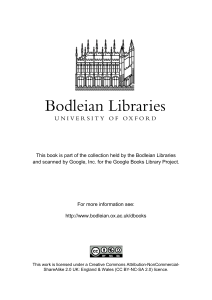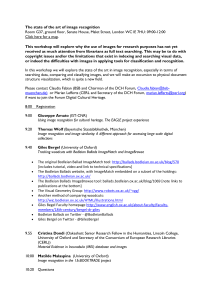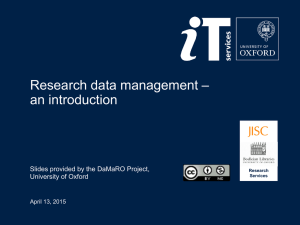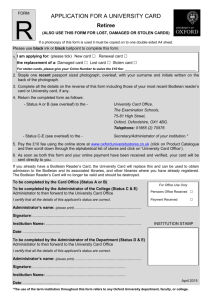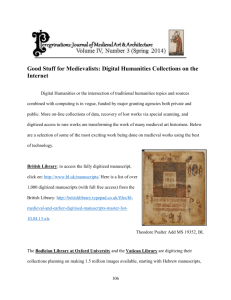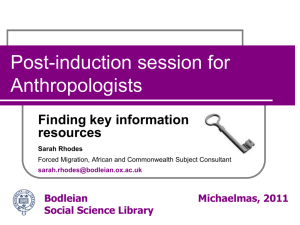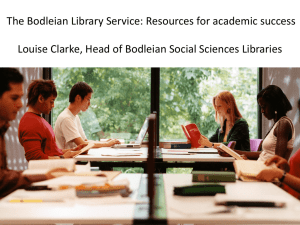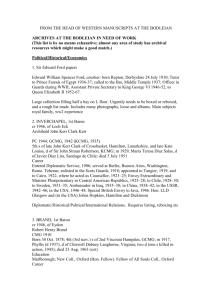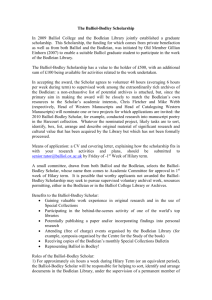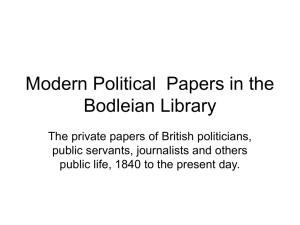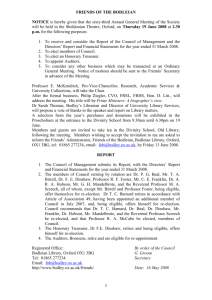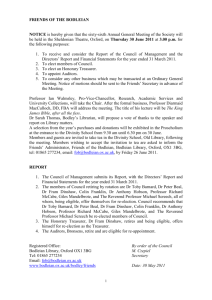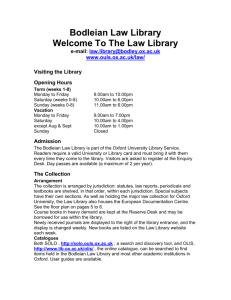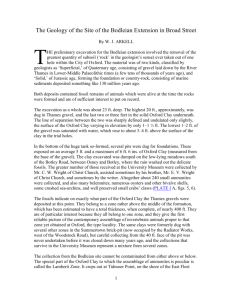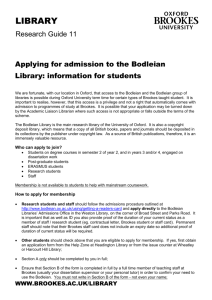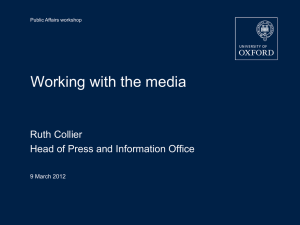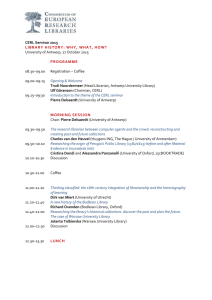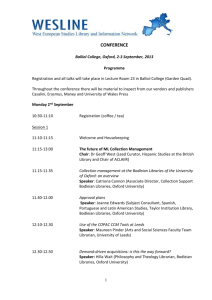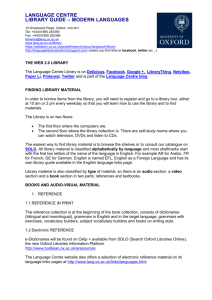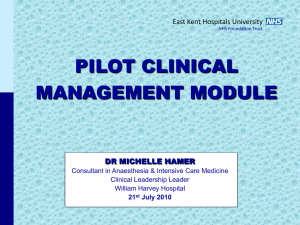What is learning? - Bodleian Libraries
advertisement
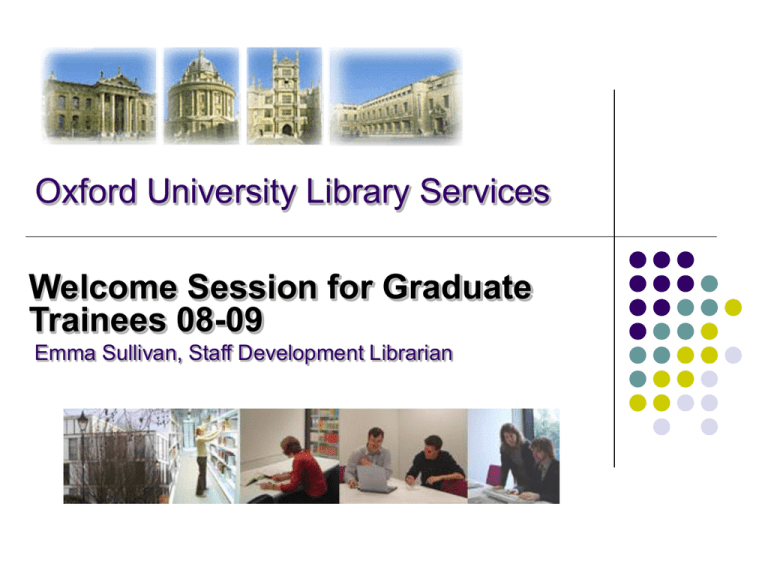
Oxford University Library Services Welcome Session for Graduate Trainees 08-09 Emma Sullivan, Staff Development Librarian Programme 1.30 Welcome/Introductions 1.45 Group Feedback 2.15 Introduction to … Oxford and Its Libraries Graduate Trainee Programme/Year 3.00 Cake Break and Projects 3.30 Learning Effectively 4.30 Final Thoughts 4.55 END Who Are You? Name Where are you working? What were you doing before? What is your greatest skill? Group Feedback 5 groups … 10 minutes …discuss! Hopes Concerns Questions History Oldest University in English speaking world 800 year old tradition of discovery & invention First University Library founded 1320 in the Church Bodleian Library founded 400 years ago Collegiate university: 39 colleges (+6 halls) Dominus Illuminatio Mea (The Lord is My Light) Colleges select/admit; housing; libraries; sports/social/pastoral care; tutorials/welfare University organises course content; lectures/seminars; sets exams; awards degrees Also a town with its own industrial heritage! Oxford University Congregation Legislative council Colleges Council Departments Policy making and strategy Vice Chancellor Senior officer – John Hood Academic Services and University Collections Library Land OULS Departments Colleges Subject Approach Area Studies & Bodleian Bodleian Japanese Library, Commonwealth & African Studies, Chinese Studies Library, Latin American Centre Library, Middle East Centre Library, Oriental, Taylor Bodleian Slavonic & Modern Greek Library Humanities & Bodleian English Faculty, History Faculty, Theology, Music, Philosophy, Taylorian Medical Health Care Libraries, Churchill, Old Road/Knowledge Centre Science Radcliffe Science Library, Plant Sciences, Zoology Social Science Education, Law, Refugee Studies Centre, Said Business School, Social Science Library (Vere Harmsworth Library & Continuing Education) Special Collections Bodleian & Faculty/Department Libraries & Colleges Thomas Bodley’s Vision Bodleian refounded 1602 Access to Collections: Bodley’s “Republic of Letters” Legal deposit privilege since 1610 60% of Bodleian readers not members of Oxford University Statistics Largest integrated library system in any academic institution in the UK, and one of the largest in the world 38,000 current users (University card) 11 million items (increasing by >350,000 items per annum) 158 miles of materials 581 (FTE) staff Change Themes Economic Political Budget Estates Processes Sarah Thomas Social Collections Structure Technological Trainee experience Daily work in your library Reader Services Work Technical Services Work Projects Don’t be afraid to ask or use your initiative! Trainee experience Projects Think about in Michaelmas Term Project Showcase OWL Non-library specific projects Trainee experience Training Programme Every Wednesday afternoon Talks, Visits, IT Training Attendance and feedback Extra experiences Trainee experience Applying to Library School Deadlines are quite early AHRC Funding Provide help and advice Trainee experience Feedback End of term review End of year review Meeting supervisor Do talk to Staff Development Advice from last year’s trainees Time for … Learning Styles Which is your preference? How To Learn Effectively To discover your learning style: Look at learning in general Learn about the learning cycle Do questionnaire Look at different preferences How knowing your preferences helps you and others Learning Theory Honey and Mumford 4 years in the late 70’s looking at learning style preferences of managers Published the Manual of Learning Styles in 1982 What is learning? OED states: “ To acquire knowledge of (a subject) or skill in (an art, etc.) as a result of study, experience, or teaching. Const. from, of (arch.), at (a person). Also, to commit to memory (passages of prose or verse), esp. in phrases to learn by heart, by rote”. The Learning Cycle Stage 4 Planning the next steps Stage 1 Have an experience Stage 3 Conclude from experience Stage 2 Review the experience What happens when the learning cycle goes wrong? Distortions: Addicted to the experience Analysis to paralysis Quick fix Jumping to conclusions A Starting Point Various factors influence learning: The learner Your situation Subject matter Methods used Now for the science bit… Different Styles Activist Pragmatist Reflector Theorist Activists Like to learn from: New experiences Here and now In at the deep end Involved with others Find learning hard if: Passive role Repetition Instructions Detail Reflectors Like to learn from: Rumination Stand back Painstaking research Own time Find learning hard if: Forced into limelight Action and no plan Insufficient info Spontaneity Theorists Like to learn from: Logic Inter-relationships Question basics Complexity Find learning hard if: Feelings Hotchpotch of methods Banal/Shallow Out of tune with colleagues Pragmatists Like to learn from: Practical learning Link between learning and problem Chance to implement skills End product Find learning hard if: No immediate need Not realistic Round in circles Political obstacles How can we learn better? Learning preferences are not fixed Need to be a good all rounder to learn well Play to your strengths Strengthening your least favourite styles Learning log How does this help me and others? Optimise your learning Become a better learner Find a suitable job Relationships Manager Team work Presentations Final Thoughts Background to the university Background to the programme and what to expect Background to learning effectively Enjoy your time here Questions?
